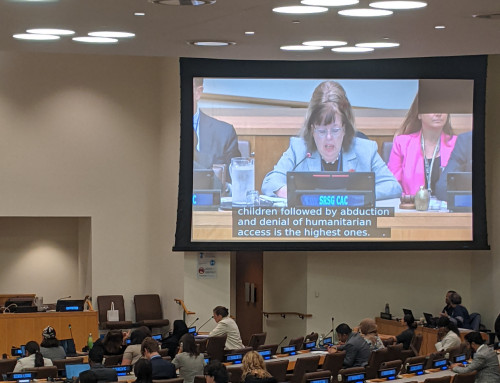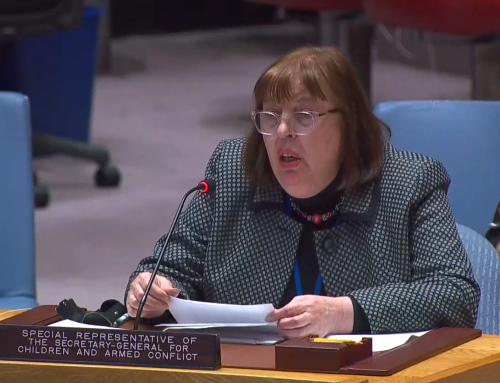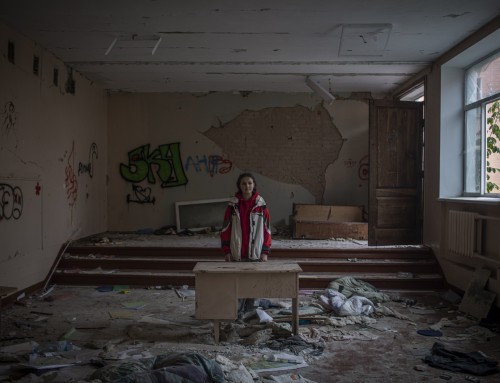Statement before the Security Council on the occasion of the Open Debate on Children and Armed Conflict
***
by
Radhika Coomaraswamy
Under-Secretary-General
Special Representative of the Secretary-General
for Children and Armed Conflict
***
Click on the image to watch the video
Webcast – With Introduction by the Secretary-General
Tuesday, 28 November 2006
***
Señor Presidente, Mr. Secretary-General, Excellencies, Ladies and Gentlemen,
I have the honour to present the sixth annual report of the Secretary General on children and armed conflict (S/2006/826) in the presence of the Secretary General, Mr. Kofi Annan. One of his most enduring legacies will be the measures that have been taken to protect children in armed conflict in the last ten years. We are grateful for his leadership, his vision and his encouragement.
Depuis quelques années,le Conseil de sécurité a pris des mesures sans précédent en faveur des enfants touchés par les conflits armés. Il s'est mobilisé davantage pour protéger les plus vulnérables. Sa résolution 1612 (Seize Douze) adoptée en juillet deux mille cinq, représente une étape très importante. En donnant naissance au groupe de travail du Conseil de Sécurité sur les enfants et les conflits armées, ce texte phare a doté le Conseil d'un cadre de travail plus efficace. Le groupe de travail se réunit tous les deux mois pour examiner des rapports sur les situations préoccupantes et pour prendre des mesures concretes dans l'intérêt des enfants de la guerre.
Indeed, I am happy to report a number of successes since the Secretary General submitted his report last year. As is attested in the Secretary-General's 6th annual report, the UN system in country situations of concern has increased the flow of timely accurate, objective and reliable information to the Council. The UN country teams in Burundi, Côte d'Ivoire, Democratic Republic of Congo, Somalia, Sudan, Sri Lanka and Nepal have come together in very short order to produce reports of quality which have served as a starting point to the Security Council Working Group's action on behalf of children in these key situations of concern. The Council's Working Group, under the capable chairmanship of the Permanent Representative of France, has worked at an impressive pace to outline a program of action for 2006. It has also defined a working “toolkit” of possible actions the Council can take to protect children from the most grave abuses perpetrated against them.
Furthermore, the Working Group, in cooperation with concerned member-states, has undertaken a series of very useful recommendations on country situation reports on CAAC on the Democratic Republic of Congo and the Sudan. I would like to stress that the hallmark of the 1612 mandated monitoring and reporting exercise, as well as the annual reporting to the Council, has been a constructive dialogue, at all levels, with the member-states concerned for the benefit of the war-affected children.
In addition to the monitoring process under Security Council resolution 1612, other successes have been recorded in conflict situations. Many of the peace agreements signed over the last few years including in Côte d'Ivoire, Burundi and Sudan have included child protection provisions and a framework for child demobilization. We hope that such provisions will be standard paragraphs in all peace agreements where children have been combatants. In this regard, I would like to raise my sincere hope to see concerted attention to the immediate release of children associated with fighting forces in the peace talks currently underway in Nepal.
After the passing of Security Council resolution 1612, parties have approached UNICEF and our office to enter into action plans to demobilize child soldiers. Commitments have been made by parties in Côte d'Ivoire, Burundi, Myanmar and Uganda. We hope to consolidate these gains by ensuring that we move beyond good intentions to actually facilitating the formulation of action plans and the timely release of children so that they may be reintegrated into their respective societies. We are also happy to report that Sudan, the Democratic Republic of the Congo, Lebanon, Israel and the Occupied Palestinian Territories have extended an invitation to me to visit their countries in order to enter into a constructive dialogue regarding issues relating to children and armed conflict. I hope to conclude these visits in the first half of 2007.
Señor Presidente,
Despite these progressive developments many challenges remain and more action has to be taken to protect the interests of children trapped in situations of armed conflict. Though a great deal has been done in formulating standards and receiving commitments, the actual implementation on the ground is far from satisfactory. The issue needs to be properly mainstreamed within the UN system, in line with the recommendations of the independent review of the monitoring and reporting mechanism. Furthermore, parties should be made aware of consequences if they do not live up to their commitments. We therefore note with appreciation the recommendations of the Security Council Working Group and hope to monitor closely the follow up action of the parties concerned.
So far the process of scrutiny and monitoring has been selective and focused on only a few countries. It is our belief, jointly shared with UNICEF and other partners, that we must expand the focus to all situations of armed conflict so that there is equal treatment of children regardless of where they live. This is important for the process to be seen as legitimate and fair as well as in the interest of the children concerned. We urge the Security Council Working Group to move the agenda forward, in consultation with the countries concerned.
Señor Presidente,
The recruitment and use of child soldiers has been the main concern of the Council and the gateway to the annexed lists of the annual Secretary-General's report. We feel this was a great step forward for the Council, and parties that continue to engage in this serious crime must be put on notice that targeted measures will be undertaken against persistent violators. However, there are five other grave violations which also deserve our attention. In particular, we would like to draw the attention of the Council to the increasing number of reports of sexual violence as an instrument of war. It is our belief that the gateway to the annexed list of parties should include all the grave violations. We are especially eager to reflect grave sexual violence more fully in these annexed lists as this crime is of especial gravity and the number of children experiencing grave sexual abuse as a weapon of war grows year by year. We urge the Council to consider this measure as an important step forward in the monitoring process in the coming years.
Señor Presidente,
As we watch the events unfold around the world, there are new substantive issues that are also emerging that have grave implications for the protection of children in situations of armed conflict. Increasingly in warfare around the world, the distinction between civilians and combatants is not respected. In the recent conflict in Lebanon, more children were killed than combatants. It is important that the Security Council and member states reiterate their commitment to actively uphold international humanitarian law. These laws and standards have been negotiated over two centuries. The principles of protecting civilians, of proportionality, of keeping military assets away from civilian centres, and respecting safe zones such as schools and hospitals have been the hallmarks of this international consensus. It is equally important that states and non state actors respect these laws of war and it is important that the Security Council send a clear message that deviations from these principles will be condemned.
Another issue that concerns us is the migration of child soldiers and the recycling of those children within conflict zones. In many countries after demobilization, many child soldiers are remobilized and with the help of other parties and sometimes mercenaries they often end up in neighbouring countries. We know of cases of children who have been demobilized in Sierra Leone and then resurfacing in Côte d'Ivoire, and similar movements of demobilized children in the Great Lakes region of Africa.. For our work to be successful, it is essential that the longer term reintegration needs of child soldiers and other children affected by war is given as much importance as the punishment of perpetrators. The effectiveness and sustainability of demobilization and reintegration programmes run by the national governments, UN agencies, international and local NGOs will finally determine whether children, scarred by war will reap the benefits of a peaceful future.
Señor Presidente,
At lunch time today, our office will host an event. We will bring together ‘Children of War', – who have seized the opportunities available to them and who have made a great success of their lives. They will speak to the UN community of their experiences. Theirs is the story of hope and the triumph of the human will. It is their life story that tells us that if we are committed to the protection of children in these conflict zones, we can help them to rebuild their lives and become outstanding citizens. The human spirit, especially in children, is resilient. It is important that we build on that resilience and give them all the necessary support and protection.
Thank you Señor Presidente.
***





